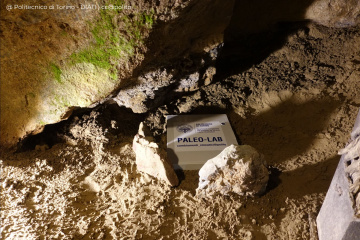cc-paleo-lab

Coordinator: Prof. Bartolomeo Vigna
Presentation
The laboratory deals with field measures aimed at the reconstruction of the paleoclimate in the Alpine region. It is a multi-site lab with several measuring sites mainly in underground cavities, which will exploit the thirty-year research experience of DIATI staff at the “Karst Laboratory of the Cave of Bossea”. In particular, the following issues are investigated:
- monitoring of groundwater over time and their supply mode, with particular reference to snow melting processes and possible links to climate change dynamics
-monitoring of underground fossil glaciers with particular reference to air-rock temperatures, monitoring of glacial mass loss and dating of glacier mass formation
- Reconstruction of paleoflow (and so paleoclimate) from morphometric surveys of detail patterns that are generated on carbonate concretions
-study of the thickness and physical characteristics of sediments in glacial and periglacial lakes and rivers using acoustic and electromagnetic geophysical techniques.
Ongoing projects and activities
Monitoring of underground glaciers and air-rock temperature
Research in collaboration with Arpa Piemonte started in 2016 through the installation of air-rock temperature sensors in different natural cavities of the alpine sector where there are deposits of ice during the evident melting caused by temperature rise. There are currently three sample sites where temperature values are acquired (with a monitoring interval every 2 hours) in different areas of karst cavities containing ice deposits (at surface and at different depths). In the most interesting underground glacier, a series of ice cores were collected, then transported to the Euro Cold Lab of the Department of Earth and Environmental Sciences, Università Milano-Bicocca for further analysis. State of research progress: advanced.
Air-rock-water temperature monitoring in the Cave of Bossea
Research in collaboration with the Karst Laboratory of the Cave of Bossea, Arpa Piemonte, INRIM through installation of automatic detectors of air-water-rock temperature inside the Cave of Bossea and creation of the climatological research center of Bossea. State of research progress: medium-low.
Reconstruction of hydrological and climatic variations in the last 7,000 years through the speleothemes of Bossea
Research in collaboration with the Paleoclimatology Laboratory of the Department of Earth Sciences of the University of Pisa. Two stalagmites were sampled in the Cave of Bossea and then delivered to the Paleoclimatology Laboratory for subsequent analysis.
These concretions have been sectioned along the accretion axis, polished and prepared for sampling for U/Th measurements for the purpose of their chronological classification and for the analysis of stable isotopes. Thin sections were also made to best select the samples for dating. In order to minimise samples contamination for dating, the "block" method was used.
In simple terms, the method consists in the extraction of calcite blocks which have been subsequently rinsed in distilled water in an ultrasonic bath and then weakly attached with an acid to remove any possible, with an air-drill completely in steel and plastic (AIR LINE KIT).
The next dating step follows the protocol illustrated in Hellstrom (2003). A total of 21 U/Th dates have been obtained. The isotopic ratios (13C/12C and 18O/16O) of speleothetic calcite were obtained with a Ap2003system helium flow spectrometer (Zanchetta et al., 2007) on a 1 mm sample dust with a 1 mm point resolution. In total 1087 measurements of isotopic ratios were obtained. State of research progress: advanced.

News
- on August 30th 2022, the video “PaleoLab - Bossea Cave as a lab to study the paleoclimate in the Alpine region”, an excerpt of the theatre performance “Cambiare il clima” designed by Faber Teater in collaboration with DIATI, is finalist in the cathegory “Geoscience Professionals” at the Earth Futures Festival. Dedicated to the role of caves in monitoring climate change, the video tells about the research activity of the PaleoLab led by prof. Bartolomeo Vigna, on stage with the actors Marco Andorno and Sebastiano Amadio, directed by Diego Díaz.
- On 17 July 2021 Bossea cave hosted the course “Monitoring of environmental parameters in karstic cavities” organized by the Italian Speleological Society. The PaleoLab was involved in the framework of Showcave project and the faculty included DIATI’s Prof. Vigna and Prof. Boano
- On 22 May 2020 the University of Pisa hosted the online seminar " Survey and monitoring of the cryosphere in the Alps ". Within the seminar, Prof. Bartolomeo Vigna gave a presentation on “Study and monitoring of natural cavities with and without ice: the case study of "Rem del ghiaccio" and Bossea”.
- On 17th December 2019 the inauguration of the new component of the Laboratory of Bossea dedicated to climate change was held. TG Leonardo’s report (from minute 6) and Poliflash article.
